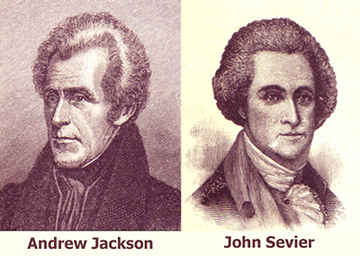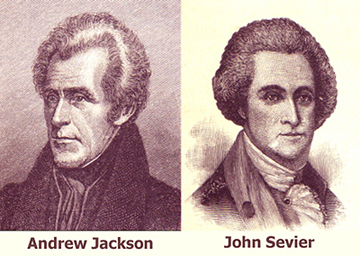East Tennessee has been blessed with capable leaders who helped shape the Volunteer State into what it is today. Test your knowledge of the region’s pioneers by matching their names with their contributions. The answers are located at the end.
Choices: A- Daniel Boone, B- Tidence Lane, C- Andrew Jackson, D- Elihu Embree, E- William Bean, F- John Sevier, G- Katherine Sherrill, H- William Blount, I- Samuel Doak, J- Henry Johnson, K- Andrew Johnson, L- David Crockett and M- Bob Taylor.

1. This individual was among the first Baptists to set foot on Tennessee soil, having the distinction of pastoring the first permanent church organization of any denomination in the state of Tennessee, Buffalo Ridge Baptist Church in the Gray community.
2. President George Washington appointed this veteran of the Revolutionary War to serve as governor of the Southwest Territory and superintendent of Indian affairs. He later became the first U.S. senator to be impeached.
3. Reported to be the first white settler west of the Alleghenies, this person became a companion of Daniel Boone in 1760. In 1768, he and his family settled at Boone's Creek, a small tributary of the Watauga River.
4. Known as “Bonnie Kate,” this hardy and adventurous woman became the wife of John Sevier after he bravely pulled her to safety during an Indian attack at Fort Watauga at Sycamore Shoals.
5. This trailblazer, pathfinder and Indian fighter gave pioneers and settlers courage to penetrate the vast wilderness regions. He left his mark on the area by carving his initials in a large beech tree north of the city.
6. The American Presbyterian clergyman and educator who became an advocate for the abolition of slavery. Later he established an academy that became known as Washington College, the first one west of the Appalachians.
7. This Washington County native, son of a Quaker minister, abolitionist leader and publisher of the first abolitionist paper in the United States, “The Manu-mission Intelligence,” became an ardent anti-slavery advocate and remained so until his death.
8. This pioneer arrived in the area in 1856 and established a city that would later bear his name. Over time, he built a combination residence and merchant store, train depot and water tank.
9. “Old Hickory,” so named because of his robustness, was a colorful Jonesboro lawyer, Indian fighter and leader of the “Tennessee Volunteers” in the Battle of New Orleans. He became the first United States president from west of the Appalachians.
10. This 17thpresident of the United States assumed office upon the assassination of Abraham Lincoln. He led the nation during the Reconstruction era and became the first president to be impeached.
11. The witty Democratic contender for governor of Tennessee during the famous 1886 “War of the Roses” campaign served one term in the U.S. House, three as governor and one in the U.S. Senate. He co-founded The Comet, an early Johnson City newspaper.
12. The Tennessee hero of the Battle of Kings Mountain in South Carolina became governor of the State of Franklin, first governor of the State of Tennessee, Indian fighter and state-builder.
13. This celebrated 19th-century American folk hero, frontiersman, soldier and politician was born on the Nolichucky River near Limestone, Tennessee and died fighting the Battle of the Alamo in Texas.
Answers: 1B, 2H, 3E, 4G, 5A, 6I, 7D, 8J, 9C, 10K, 11M, 12F and 13L.
